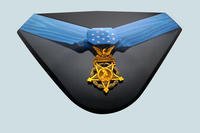In the spring of 1942, a group of stranded U.S. servicemen huddled inside a Chinese riverboat, hiding from Japanese soldiers in the invaded country. Suddenly, they heard what seemed to be an American voice: "Anyone in there?" The hidden men feared trickery and capture until they heard the voice again; it was a full-blown Southern accent.
That voice belonged to missionary John Morrison Birch, and the men he rescued from the boat were Col. Jimmy Doolittle and his famed "Tokyo Raiders." Birch brought the group down the Chienteng River to the town of Lanchi, from where they were able to move on to safety.
Doolittle was much taken with the young missionary, whose native garb and near-fluent grasp of Mandarin Chinese allowed him to continue his goal of bringing the Christian gospel to the Chinese mainland despite its occupying force. Birch had sought a position as a chaplain, but when Doolittle told Gen. Claire Chennault about his rescuer, Chennault recognized Birch's potential as an intelligence resource. Commissioned a first lieutenant on July 4, 1942, Birch became "the eyes of the 14th Air Force (the Flying Tigers)" -- with a stipulation that he be allowed to preach whenever possible.
Both in Chungking proper and in the interior, Birch used his language skills and analytical talents to draw up a network for the China Air Task Force, which replaced the American Volunteer Group. By all accounts, Birch was a man of great skill and even greater modesty; when he was awarded the Legion of Merit in 1944, he wrote to his mother, "they ought not to cheapen the decoration by giving it when a man merely does his duty." By war's end, Birch had achieved the rank of captain and his duties had come under the spreading auspices of the Office of Strategic Services (OSS).
Shortly after the war ended, Birch and a party of 11 Chinese were sent by the OSS to accept the surrender of a Japanese base. On Aug. 25, 1945, they met a group of Chinese communists who refused to allow them to pass. They disarmed Birch, and shot his aide Lt. Tung when he tried to intervene (Tung lived to tell the tale of Birch's treatment). Birch's ankles were bound and he was made to kneel for execution, then shot in the back of his head. Birch, who had spent the war working behind enemy lines to serve both God and country, is considered by many to be the first casualty of the Cold War.












